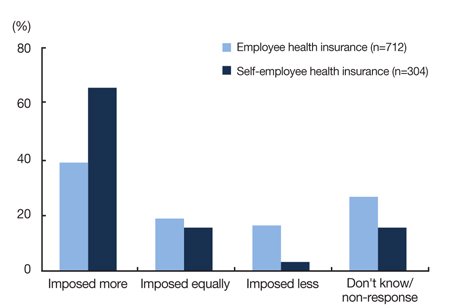J Korean Med Assoc.
2013 Apr;56(4):326-335. 10.5124/jkma.2013.56.4.326.
A survey on the appropriate level of premiums for National Health Insurance
- Affiliations
-
- 1Research Institute of Healthcare Policy, Korean Medical Association, Seoul, Korea.
- 2Department of Preventive Medicine, Soonchunhyang University College of Medicine, Cheonan, Korea. parky@sch.ac.kr
- KMID: 2192935
- DOI: http://doi.org/10.5124/jkma.2013.56.4.326
Abstract
- As the National Health Insurance Law was established in 2000, the finances of workplace health insurance and regional health insurance were integrated. However, since employee health insurance (workplace insurance) and self-employed health insurance (community insurance) still use different contribution rating systems, the problem of inequity of premiums has caused ongoing controversy. Therefore, to examine the public's satisfaction with premiums calculation methods, and collect opinions on solving the problem of inequity of premiums, this survey was performed. A computer-assisted telephone interview with multi-stage stratified sampling of the population in Korea was performed. Responses were obtained from 1,016 people aged 25 to 64 years. The analyses showed that, to the question about the premiums calculation methods, more respondents answered that they were unsatisfied (41.4%) than satisfied (36.6%). The responses differed depending on the type of health insurance. The proportion of those who were satisfied with their insurance was relatively higher among those with employee health insurance. On the other hand, among those with self-employed health insurance, the proportion of those who were dissatisfied with insurance was 3 times more common than satisfaction with it, showing that those who belong to the self-employed health insurance group are less satisfied with the premiums calculation methods. It was also found that the majority people perceive that the current single payer health insurance system should be divided into mutually separate employee and self-employed health insurance systems or a multiple payer health insurance system (60.3%). To achieve premium equity in the future, the Health Insurance Corporation should make a greater effort to determine income levels correctly. In the institutional improvement process of the premiums contribution rating system in the future, it seems necessary to carry out further research on a multiple payer insurance system reflecting the attitudes and demands of the people.
MeSH Terms
Figure
Reference
-
1. Ministry of Health and Welfare. Health welfare white paper. 2011. Seoul: Ministry of Health and Welfare.2. National Health Insurance Service. National Health Insurance [Internet]. cited 2013 Feb 14. Seoul: National Health Insurance Service;Available from: http://www.nhic.or.kr/portal/site/main/MENU_WBDAB00.3. Kang HC, Park EC, Lee KS, Park TK, Chung WJ, Kim HJ. Changes in distributive equity of health insurance contribution burden. J Prev Med Public Health. 2005. 38:107–116.4. Hong BE, Bae JY, Park MH, Kang JM. Equity of the National Health Insurance contribution between the self-employed and employees. Korea Soc Policy Rev. 2012. 19:199–231.
Article5. Park YC. An analysis of the effect of income-redistribution in the merged health insurance program since July 2000. Korean Policy Stud Rev. 2002. 11:135–160.6. Hur MH, Sung YM. Contribution system of National Health Insurance: an empirical study on equity in a rural village. Korean Policy Stud Rev. 2003. 12:175–200.7. Shin HJ, Kim KH, Lee DH, Choi KC, Bae SI. A study on the equity of insurance contribution of the National Health Insurance. 2008. Seoul: National Health Insurance Corporation.8. Moon SW, Kim CS, Lee YG, Hwang RI, Choi ID, Seo SR. A study on the health care system and medical social security in foreign country 2008. 2008. Seoul: National Health Insurance Corporation.9. Shin EC, Jung KT, Kim HS. Evaluating the efficiency of management organizations of the National Health Insurance in Korea. 2008. Seoul: Research Institute for Healthcare Policy, Korean Medical Association.10. Ko SJ. A day's premium is 100,000 won? Problem of the National Health Insurance contribution in Korea. Doctor's News. 2010. 07. 20. cited 2013 Jan 7. Available from: http://www.doctorsnews.co.kr/news/articleView.html?idxno=64075.11. Park YH, Hong TS, Yoon HB. A survey of national satisfaction on National Health Insurance system in Korea. 2004. Seoul: Research Institute for Healthcare Policy, Korean Medical Association.12. Seo NK, Park JY, Lee AK. A survey of national satisfaction on National Health Insurance system in Korea 2005. 2005. Seoul: National Health Insurance Corporation.13. Lee YG, Kong KY, Kim CS, Choi ID, Choi KC, Ko MC. Equity of the contribution system of the National Health Insurance. 2006. Seoul: National Health Insurance Corporation.14. Shin YS, Lee JY, Yoon GH. Raising equity in health insurance contributions. 2011. Seoul: Korea Institute for Health and Social Affairs.15. Seo SR, Choi ID, Moon SW, Kim CS, Hwang RI. A survey of national satisfaction on National Health Insurance system in Korea 2008. 2008. Seoul: National Health Insurance Corporation.16. Blendon RJ, Leitman R, Morrison I, Donelan K. Satisfaction with health systems in ten nations. Health Aff (Millwood). 1990. 9:185–192.
Article17. Mossialos E. Citizens' views on health care systems in the 15 member states of the European Union. Health Econ. 1997. 6:109–116.
Article18. Blendon RJ, Benson JM. Americans' views on health policy: a fifty-year historical perspective. Health Aff (Millwood). 2001. 20:33–46.
Article19. Blendon RJ, Schoen C, DesRoches C, Osborn R, Zapert K. Common concerns amid diverse systems: health care experiences in five countries. Health Aff (Millwood). 2003. 22:106–121.
Article20. Coulter A, Jenkinson C. European patients' views on the responsiveness of health systems and healthcare providers. Eur J Public Health. 2005. 15:355–360.
Article21. Bleich SN, Ozaltin E, Murray CK. How does satisfaction with the health-care system relate to patient experience? Bull World Health Organ. 2009. 87:271–278.
Article22. Lu JF, Hsiao WC. Does universal health insurance make health care unaffordable? Lessons from Taiwan. Health Aff (Millwood). 2003. 22:77–88.
Article23. Choi BH, Shin HW. A equity of insurance contribution and benefit of National Health Insurance by income class. Health Welf Policy Forum. 2005. 104:87–97.
- Full Text Links
- Actions
-
Cited
- CITED
-
- Close
- Share
- Similar articles
-
- A suggestion of health insurance for children
- Controversy related to the preliminary coverage system of health insurance
- Correction: Effects of Health Information Technology on Malpractice Insurance Premiums
- Cancer-free Life Expectancy in Small Administrative Areas in Korea and Its Associations with Regional Health Insurance Premiums
- Is free medical care possible?


